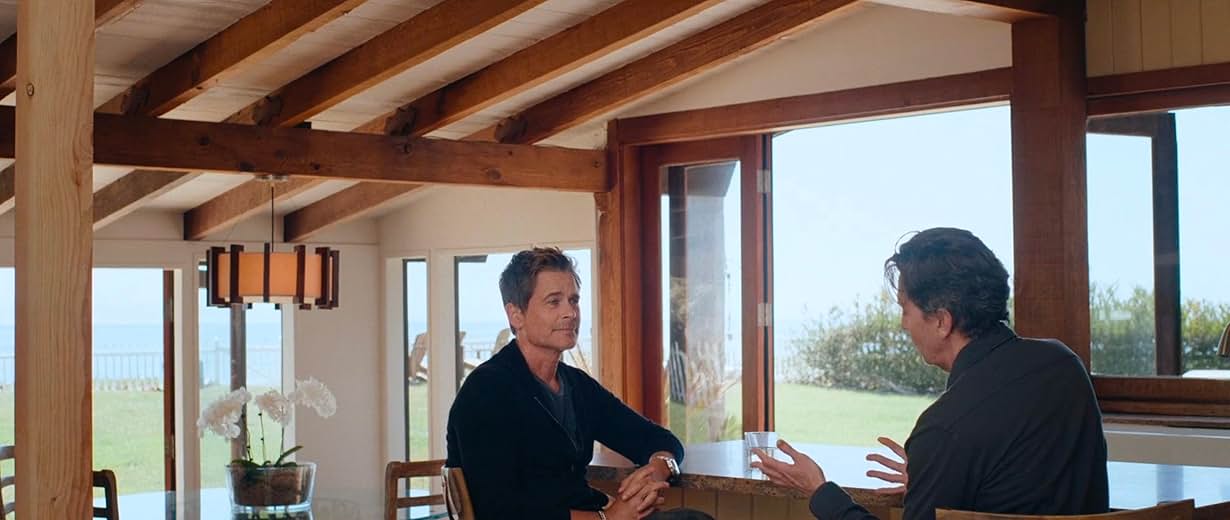Brats
First screened and reviewed in June 2024
Director: Andrew McCarthy. Documentary about the (in)famous "Brat Pack" of young breakout actors in the 1980s and how they have negotiated that tag over subsequent decades.
VOR:
①
May well have been as therapeutic for McCarthy as he implies, or as generative of fond re-encounters. Barely even counts as a "movie."
 |
| Photo © 2024 NEON |
Look, I can be compassionate about Andrew McCarthy really trying to confront some long-congested and deeply ambivalent feelings about the pejorative kiss-off that became the defining signifier, apparently, of his professional life if not his entire life. He seems to be making the effort he knows how to make, within the bounds he has consciously or unconsciously set, and in flashes he comes across as an open and thoughtful guy who's abashed that all of this still weighs so heavily on him.
But, stipulating that the filmmaking is just a top-down embarrassment, and taking a cue from the film's own register as itinerant, honesty-forward therapy session for McCarthy specifically, isn't it striking that he asks not one Brat Pack colleague a single on-camera question that gestures at other parts of their lives or even their careers beyond the one they share in common? Who is it now who's reducing not his journalistic subjects but his peers—if that's a good name for people he claims not to have spoken to for 30 years—to this complexly affectionate-derogatory epithet? Late in the film, McCarthy will surprise himself by hearing in David Blum, the journalist who devised the phrase, some of the same uncertainty and regret of the Brat Packers themselves. McCarthy doesn't seem to get he's got a little Blum in him by now, too.
All kinds of obvious things can't be said in Brats, even in a movie that's all about airing the truth. For example, several of these actors attained a level of long-term success that eluded McCarthy. Whether that's the dumb luck of a capricious industry or a sign of greater resilience, ability, or persistence goes totally unbroached, even amid the visible splendor of Demi Moore's, Rob Lowe's, and Jon Cryer's homes. Meanwhile, the Brat Packer who seemed to lose the most momentum overnight, Judd Nelson, is mostly mentioned here as a frustrating obstacle to McCarthy's completist plan for his project—almost as if Nelson's got, I don't know, bigger or different or smellier fish to fry, while McCarthy takes a cell phone call from a scenic jetty on a rustic sunlit lake.
Emilio Estevez, born into an acting family from which he's never been seen as separate, might know some things the others don't about how you stake an individual claim and/or how you reconcile yourself to being stitched forever into born or assigned kinships. Ally Sheedy fought her way to a career reinvention as a deft, interesting, risk-seeking actor (High Art, Hedwig) and then that seemed to stall. How does that rank vis-à-vis the overnight chastening of the "Brat Pack" label? Rob Lowe may be that much more charming or that much more dogged or that much more talented or that much more handsome that he's survived way worse than the Brat Pack moniker, and it doesn't seem coincidental that he, too, is subject to McCarthy's gripes while, dinged in one of the infinite shots of the director free associating behind the wheel as someone McCarthy "didn't necessarily get along with" back then.
Lowe does offer a rare and meaningful reframing that the Brat Pack movies coincided with the entire industry handing itself over to teens and young adults in all genres, and maybe the culture at large had (or has) a complex nest of angers, nostalgias, and laments about that. Maybe there's something to say about the 80s as a moment of unearned, hyper-accelerated, cash-flush and coked-up success for young adults with the right degree, the right agent/mentor, the right face. Just maybe, McCarthy's crew reaped a whirlwind—unfairly but not not understandably—for all the brokers and yuppies and consultants and gentrifiers whose names we don't know.
If you're curious, be curious. If you really want to know, really ask. Maybe don't stare at the letters B-R-A-T P-A-C-K like a Magic Eye illustration or a plastic 8-Ball that's eventually going to yield a new vision or a submerged truth. Maybe dig even a little into contexts, and fill in the 30+ years of accumulated experience and variegated reflection in the long-ago castmates whom you are re-homogenizing under a label that pains you.
And definitely don't say you've never talked to anyone about this topic when it seems extremely clear that you have, and you had a recent and widely toured book all about this, etc. Definitely don't continue to film the camerapeople getting needlessly copious coverage, in their strangely framed shots of conversations that rarely crack an unambitious surface. Definitely don't keep saying, e.g., "the people who went through the exact same experience" or "who have all the same feelings about it," when these very people are trying to tell you there were substantial overlaps but, no, your experiences and feelings were not the same.
Props to Howard Deutch, though, who sees a camera operator filming from the back of Andrew's car with the window half-up, such that before the long-ago director and co-star of Pretty in Pink even stand together and hug it out, Deutch blurts, "That shot's not going to be in focus." The whole movie [sic] is tenaciously, one might even say narcissistically focused, and yet stubbornly out of any real focus. At one point, McCarthy blasts John Parr's "Man in Motion," the immortal rock theme from St. Elmo's Fire, out of his parked vehicle and asks the people with him if the song resonates for them or calls anything up, or if it just seems like a fossil. But those people he's asking aren't even in the shot—just McCarthy. Which is very nearly the movie in a nutshell. Grade: D+
(I originally wrote this review on Letterboxd.)

